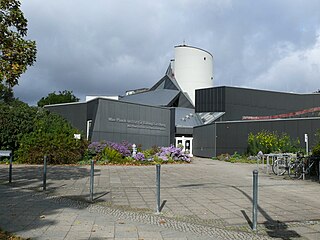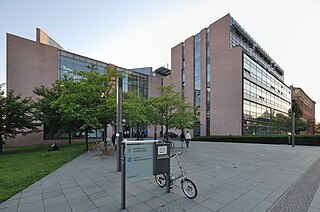
The Max Planck Society for the Advancement of Science is a formally independent non-governmental and non-profit association of German research institutes. Founded in 1911 as the Kaiser Wilhelm Society, it was renamed to the Max Planck Society in 1948 in honor of its former president, theoretical physicist Max Planck. The society is funded by the federal and state governments of Germany.

Garching bei München or Garching is a city in Bavaria, near Munich. It is the home of several research institutes and university departments, located at Campus Garching.

The Kaiser Wilhelm Society for the Advancement of Science was a German scientific institution established in the German Empire in 1911. Its functions were taken over by the Max Planck Society. The Kaiser Wilhelm Society was an umbrella organisation for many institutes, testing stations, and research units created under its authority.
The Max Planck Institute for Informatics is a research institute in computer science with a focus on algorithms and their applications in a broad sense. It hosts fundamental research as well a research for various application domains.

The Max Planck Institute of Biochemistry is a research institute of the Max Planck Society located in Martinsried, a suburb of Munich. The institute was founded in 1973 by the merger of three formerly independent institutes: the Max Planck Institute of Biochemistry, the Max Planck Institute of Protein and Leather Research, and the Max Planck Institute of Cell Chemistry.
The Max Planck Institute for Molecular Genetics is a research institute for molecular genetics based in Berlin, Germany. It is part of the Max Planck Institute network of the Max Planck Society for the Advancement of Science.

The Max Planck Institute for Molecular Biomedicine was founded on 1 April 2001 in Münster, North Rhine-Westphalia, Germany. It is part of the Max Planck Society. The current managing director is professor Sara Wickström.
The former Max Planck Institute for Behavioral Physiology was located in Bulldern, Westphalia, Germany, moved to Seewiesen in 1957. It was one of 80 institutes in the Max Planck Society.

The Max Planck Institute of Experimental Medicine was a research institute of the Max Planck Society, located in Göttingen, Germany. On January 1, 2022, the institute merged with the Max Planck Institute for Biophysical Chemistry in Göttingen to form the Max Planck Institute for Multidisciplinary Sciences.
The Max Planck Institute for Plant Breeding Research was founded in Müncheberg, Germany in 1928 as part of the Kaiser-Wilhelm-Gesellschaft. The founding director, Erwin Baur, initiated breeding programmes with fruits and berries, and basic research on Antirrhinum majus and the domestication of lupins. After the Second World War, the institute moved west to Voldagsen, and was relocated to new buildings on the present site in Cologne in 1955.

The Max Planck Institute for Evolutionary Biology is a German institute for evolutionary biology. It is located in Plön, Schleswig-Holstein, Germany.
The Max Planck Institute of Colloids and Interfaces is located in Potsdam-Golm Science Park in Golm, Potsdam, Germany. It was founded in 1990 as a successor of the Institute for Physical Chemistry and for Organic Chemistry, both in Berlin-Adlershof, and for Polymer Chemistry in Teltow. In 1999, it transferred to newly constructed extension facilities in Golm. It is one of 80 institutes in the Max Planck Society (Max-Planck-Gesellschaft).
The Max Planck Institute for Biology Tübingen was located in Tübingen, Germany; it was founded as the Max Planck Institute for Virus Research in 1954. From 1984 to 2021, it was named the Max Planck Institute for Developmental Biology. The topics of scientific research conducted at the institute cover a very wide range - from biochemistry, cell and developmental biology to evolutionary and ecological genetics, functional genomics and bioinformatics - to address fundamental questions in microbial, plant and animal biology, including the interaction between different organisms.

The Max Planck Institute of Molecular Physiology is located in Dortmund, next to the Technical University of Dortmund. It is one of 80 institutes in the Max Planck Society.

The Max Planck Institute for Medical Research in Heidelberg, Germany, is a facility of the Max Planck Society for basic medical research. Since its foundation, six Nobel Prize laureates worked at the Institute: Otto Fritz Meyerhof (Physiology), Richard Kuhn (Chemistry), Walther Bothe (Physics), André Michel Lwoff, Rudolf Mößbauer (Physics), Bert Sakmann and Stefan W. Hell (Chemistry).

The Max Planck Institute for Human Development is a social science research organization. Located in Berlin, it was initiated in 1961 and officially began operations in 1963 under the name Institute for Educational Research in the Max Planck Society, before receiving its current name in 1971. Its co-founder and first director was Hellmut Becker. The institute is part of the Human Sciences Section of the Max Planck Society.

The Max Planck Institute of Immunobiology and Epigenetics in Freiburg, Germany is an interdisciplinary research institute that conducts basic research in modern immunobiology, developmental biology and epigenetics. It was founded in 1961 as the Max Planck Institute of Immunobiology and is one of 86 institutions of the Max Planck Society. Originally named the Max Planck Institute of Immunobiology, it was renamed to its current name in 2010 as it widened its research thrusts to the study of epigenetics.

The Max Planck Institute for Infection Biology (MPIIB) is a non-university research institute of the Max Planck Society located in the heart of Berlin in Berlin-Mitte. It was founded in 1993. Arturo Zychlinsky is currently the Managing Director. The MPIIB is divided into nine research groups, two partner groups and two Emeritus Groups of the founding director Stefan H. E. Kaufmann and the director emeritus Thomas F. Meyer. The department "Regulation in Infection Biology" headed by 2020 Nobel laureate Emmanuelle Charpentier was hived off as an independent research center in May 2018. The Max Planck Unit for the Science of Pathogens is now administratively independent of the Max Planck Institute for Infection Biology. In October 2019, Igor Iatsenko and Matthieu Domenech de Cellès established their research groups at the institute, Mark Cronan started his position as research group leader in March 2020. Silvia Portugal joined the institute in June 2020 as Lise Meitner Group Leader. Two more research groups where added in 2020, Felix M. Key joined in September and Olivia Majer in October, completing the reorganization of the Max Planck Institute for Infection Biology. Simone Reber joined as Max Planck Fellow in 2023 and now heads the research group Quantitative Biology.
The Max Planck Institute of Molecular Plant Physiology is a German research institute for molecular plant physiology, based in the Golm district of Potsdam, Brandenburg. Founded on 1 January 1994, the MPIMP focuses on the study of the dynamics of plant metabolism and how that relates to the entire plant system. The institution is one of the 80 institutes in the Max Planck Society (Max-Planck-Gesellschaft).
Tobias Bonhoeffer is a German-American neurobiologist. He is director of the department Synapses – Circuits – Plasticity and current managing director at the Max Planck Institute for Biological Intelligence in Martinsried near Munich.











